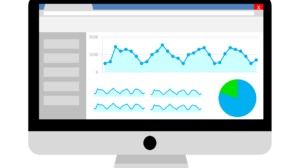If you’re in the internet marketing game for a while now, you’re definitely noticing the power and impact of social media channels over today’s online businesses. Yes, SEO and content marketing are another two important traffic generation concepts, yet they’re entirely interconnected with today’s social media marketing.
Facebook is the king, for now, owning more active users than any other social media network. Obviously, you’re reading this post because you’re already familiar with Facebook, and you may probably know how much organic, free, and targeted traffic it may provide if leveraged properly.
As Mark Harvard, a Marketing Manager at ResumesPlanet points out:
“Posting new posts (updates) on Facebook is a basic action that you can take, for free, with the purpose of attracting your potential customers’ attention. The higher purpose is to make sales (profit) and to improve the overall brand awareness and reputation of the brand (profit).”
Simply put, everyone can post content on Facebook yet very few pages manage to bring the desired social engagement. When a post has no likes, comments, or shares, it may seem that it lacks value, so people will immediately skip it.
Well, in today’s post, we’re teaching you how to improve your Facebook posts’ engagement performance. Pay attention to these 10 tips and do your best to implement what you learn here.
1. Know Who You’re Addressing Each Post To
The first and most important rule before posting on Facebook is to know your target audience well enough before you expend time, focus, energy, and money to develop/curate high-quality content. After all, the content’s quality is high the moment it appeals to the person who’s reading it.
Exceptional Facebook posts do not only “appeal” to the prospect. They also inspire, motivate, and help the reader with various needs, problems, misunderstandings, and so on.
The better you know your audience the more personalized your Facebook marketing will be and the more engagement, traffic, and revenues your business will generate.
2. Appeal to Your Audience’s Emotions
Every single human is an emotional being. If you were to make an emotional being do something, would you appeal to his reason and intellect or would you “go” straight for the emotions?
To improve the effectiveness of their posts, great Facebook marketers take the time to:
- Understand their audience well enough by consistently testing and asking for feedback
- They appeal to their audience’s emotions!
Pretty simple right? Know a person first and you’ll get to understand how that person thinks, behaves, and reacts. No matter what type of prospect you’re targeting, he/she may still be guided by emotions, as the majority of individuals are. Go for strong emotions such as curiosity, fear, anger, love, inspiration, etc.
3. Ask the Right Questions
A terrific way to engage your target audience is to ask the right questions. When people see a question, their mind cannot help but look for the answer. Even if their conscious mind doesn’t seek the answer, the subconscious will always do its work without being asked or commanded.
An easy way to go about it is to simply brainstorm 10 to 20 questions, which you believe that your target audience would love to discuss. Address the question and add a powerful visual element that doesn’t distract too much,
4. Don’t Forget About Your Powerful CTAs
The average internet user totally lacks proactivity. That’s why you must never assume your followers will immediately take the action that you want after they’re done consuming the content of your post.
To improve the engagement, you must specifically tell them what to think, what to do, what to click, what to buy, and so on. Use strong calls-to-action and your Facebook engagement will improve.
5. Post Only Relevant, Helpful, and Valuable Content
The key to both content marketing and social media success is to only post content that is extremely relevant, valuable, and helpful to your specific target audience.
Only a very small number of individuals will truly be interested in “5 Things to Look at in an Expensive Vintage Car” – it’s those people who have enough financial resources and passion to look after old, collection cars. If you post that for an audience that is highly interested and passionate in vintage cars, you will be relevant, helpful, and valuable to your audience and therefore you will improve the engagement of your social followers.
6. Look at the Competition and Find Unique Twists
How often do you take the time to sit and observe your competition? Big brands have entire teams dedicated to such tasks. They truly understand the importance of staying up to speed with the current marketplace shifts, along with the importance of their brand’s positioning in the market.
Find your 5 biggest direct competitors and assess the actions, decisions, and changes they’re constantly making. Look at each of your competitor’s posts and “dissect” them by paying attention to the following aspects:
- The purpose of their post: education/leads/sales/brand awareness, etc.
- The source and length of their post: did they curate the info? Have they written it on their own? How long is it? 2 minutes read? Half an hour read?
- How do they introduce their offer proposition? Intrusively? Mildly?
Take all the clues you get and find your own twists. Start posting in a unique way and your followers will remember you for it!
7. Find the Proper Time to Post
The members of your target audience have their “ideal time” of online activity. If they’re high-level professionals, it’s likely that they won’t be online during specific hours of the day. Therefore, they may login in the evening and miss the update that you’ve posted during the morning.
That’s why it is important to understand the hours in which you should post your content. You can find that out by consistently testing the hours of your posting and seeing which ones perform best.
8. Consistently Analyze Your Posts’ Performance
As I mentioned earlier, by analyzing your Facebook marketing activity, and especially the performance of your posts, you will find countless clues and feedback concerning what people like and dislike. You’ll find the best hours to post, and you’ll find what you shouldn’t post ever again.
The moment you identify positive optimization changes, put them into implementation and see how they perform. If you get it right, you’re ready to scale what you are doing. There are many Facebook analytics tools and software on the web, many of them offering a free version, so there’s nothing that should stop you from paying attention to the important statistics!
9. Measure, Find Patterns, Optimize, and Finally Scale
Last but not least, you’ll need to treat your Facebook marketing campaigns like a continuity, a journey, a process, instead of a result, achievement, or happening.
Analyze and measure the performance of your previously posted content. Look for meaningful patterns that can tell you whether you’re doing it right or wrong. For example, if you post 5 updates with stunning pictures and you then post 5 updates with no pictures at all, and as long as you keep the description the same, your performance metrics will surely be different.
When you identify a better performance of a specific campaign, you should always find out what you did differently in order for the positive result to show up. Lastly, when you’re convinced of the change that produced the optimized result, you should immediately scale the process by posting or investing more!
Takeaways
True Facebook marketing expertise is a result of the same trial-n-error process that absolutely all human beings consistently experience in life. You fail, you get up, you try again. You fail again, you get back up again, and eventually, if you’re consistent, persistent, and hard-working enough, you’ll become a master at the game. When you’re mastering Facebook marketing, website traffic will never represent a problem again!





